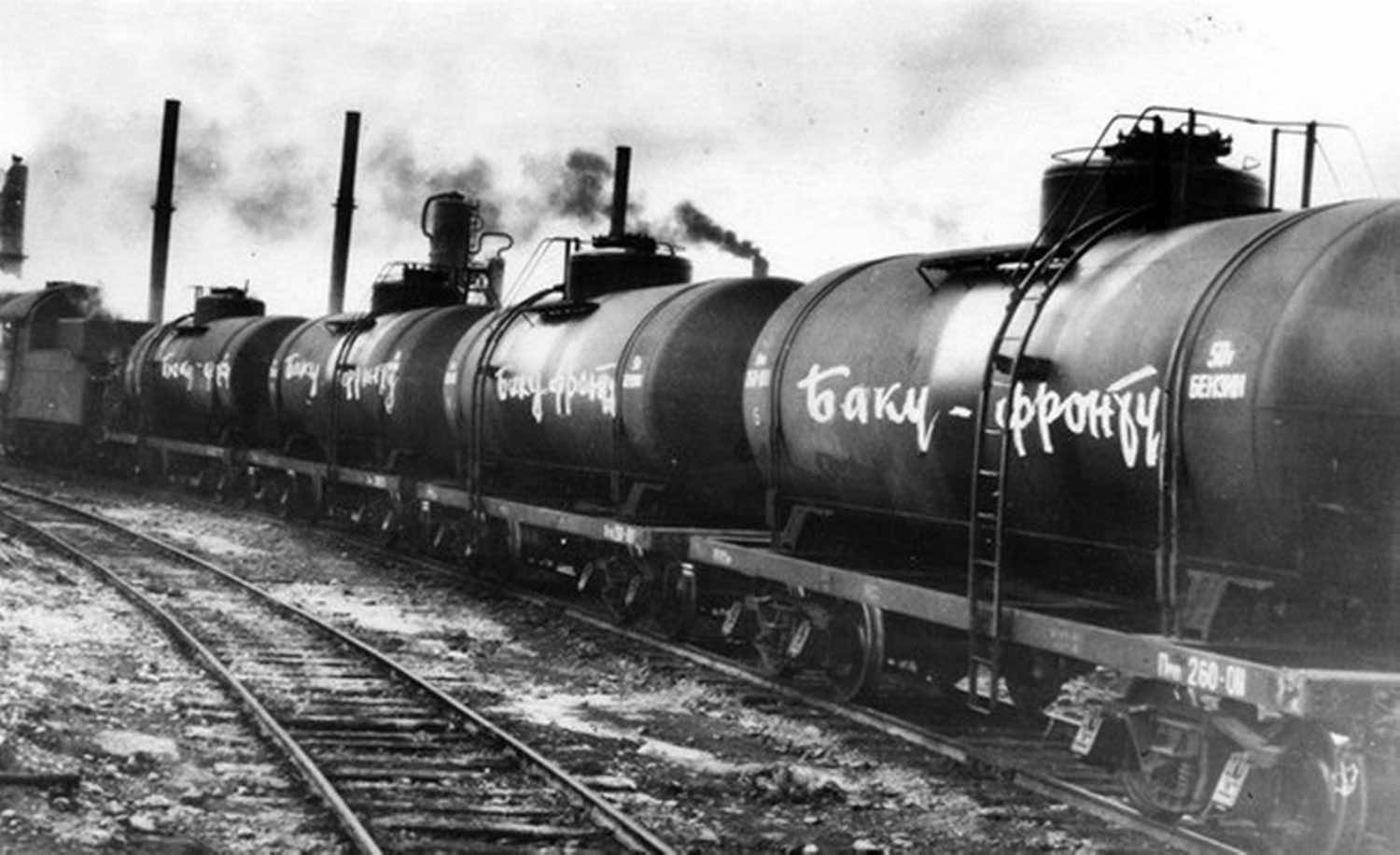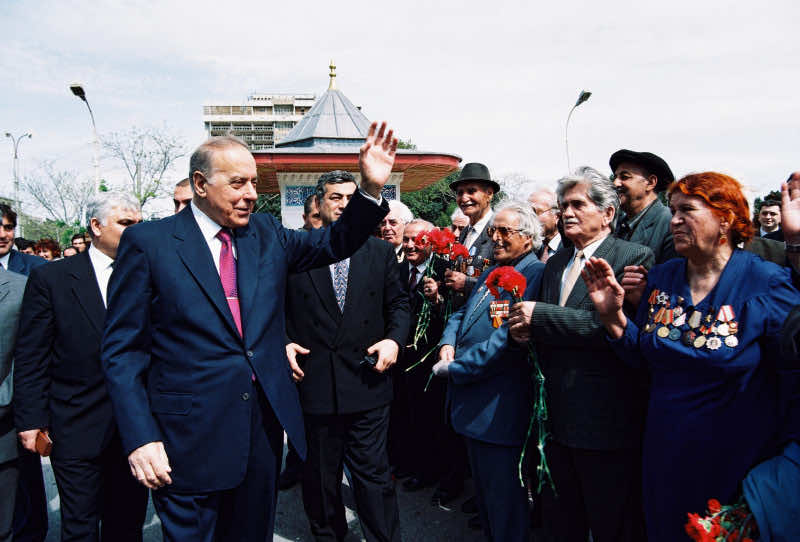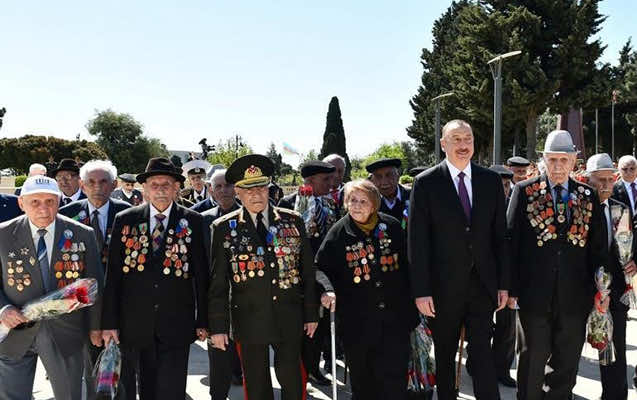Day of Victory over fascism
German troops invaded Poland on September 1, 1939, triggering World War II. In response to German aggression, Great Britain and France declared war on Nazi Germany.
World War II began. Breaking its 1939 (August 23) treaty with the USSR, Germany launched its invasion of the Soviet Union during World War II. On June 22, 1941, Germany launched its a full-scale invasion of the USSR codenamed Operation Barbarossa. The German military plan called for an advance up to a hypothetical line running from the port of Archangel in northern Russia to the port of Astrakhan on the Caspian Sea – the so-called “A-A line” before winter. This would bring the bulk of the Soviet population and its economic potential under German control.
Azerbaijan was one of the most affected republics in the Soviet Union during this war. Germany had special plan to conquer Azerbaijan. The natural wealth and resources of Azerbaijan and its strategic geopolitical position had drawn attention of the Nazis. The German government had great hopes for invading the whole East by using the oil of Baku. After victory over the Soviet Union, the establishment of a “Great Turkistani” state on the territories of the Turkic peoples was envisaged. Azerbaijan was to be fully part of this state.
It therefore, in March 1941, the Third Reich established the Continental Oil joint-stock company, which was charged with oil production, refining and transportation after the subjugation of Baku. The large industrial enterprises in Azerbaijan were to be run by Nazis according to plan. Hitler personally ordered to turn Baku into military object after the conquest. Maps of industrial and military enterprises of Baku and Absheron were also prepared. Operation Edelweiss was a German plan to gain control over the Caucasus and capture the oil fields of Baku. According to this plan, Baku supposed to be occupied, on 25 September, 1941.
The Azerbaijani people along with other nations of USSR arose as one to show great heroism and courage since the early days of the war against fascism. During the war, about 700,000 people from Azerbaijan, including more than 11,000 women, joined the Soviet Army. There were formed such divisions in Azerbaijan as the 402nd Division in August and the 223rd Division in October 1941, the 116th Division in March-September and the 271st Division in August-September 1942.
In the struggle against fascism, the people of Azerbaijan mobilized all their forces and created a strong rear. All industries started producing the products for the front. The men who went to the front were replaced by women and young people. More than 40,000 qualificated workers were trained in a short time. Working with great dedication oil workers supplied front and agriculture with fuel. During the war, Baku oil-workers provided 75 million ton of oil and that was 70% of all demands of Red Army’s fuel needs.
Baku turned into one of the largest military arsenals of Soviet Army. Baku produced 130 types of weapons and ammunition, including the famous Katyusha rockets and YAK-3 fighter jet. In 1941, the Julfa-Mincivan, Salyan-Neftchala, Papanin (now Shirvan) – Hajigabul railway lines, being of great military-economic importance were put into operation. The construction of Baku Automobile Plant was also launched.
 The collective and state farms of Azerbaijan did a vital war work by cultivating industrial crops. During the war rural labourers provided the country with hundred thousands ton of agricultural products.
The collective and state farms of Azerbaijan did a vital war work by cultivating industrial crops. During the war rural labourers provided the country with hundred thousands ton of agricultural products.
Between 1941 and 1943 the Azerbaijani people gave 15 kg of gold, 952 kg of silver and 311 million roubles worth of bonds to the country’s defence fund. Soldiers fighting at the front were sent 1.6 million units of various items and 125 wagons of warm clothing.
From the early days of the war, thousands of Azerbaijanis fought courageously at the fronts against fascism. 44 Azerbaijanis participated in the defence of the Brest Fortress and fought heroically until their last breath. The first Azerbaijani awarded the title of a Hero of the Soviet Union was a junior lieutenant Israfil Mammadov, who displayed heroism in December 1941 in the battle for the village of Pustynka in Novgorod region. Lieutenant-colonel Azi Aslanov’s tank regiment, which was at the Stalingrad front, showed great heroism in winter 1942. On December 22, 1942 he was given the rank of the Hero of Soviet Union.
On June 23-30, 1944, Major General Hazi Aslanov’s 35th Guards Tank Brigade crossed the Berezna River and liberated the town of Pleshchenitsy and 508 settlements.
Hazi Aslanov was nominated for the title of Hero of the Soviet Union for the second time, but he was given this title after his death, in 1991. Hazi Aslanov is the only Azerbaijani to be twice awarded the title of Hero of the Soviet Union.
The machine gunner Idris Aliyev destroyed more than 50 enemy soldiers in the battle of Borodino, and pilot Huseynbala Aliyev shot down 6 German planes in the battle for Leningrad.
Among the brave sons of Azerbaijan 123 men were awarded the title of Hero of the Soviet Union, 30 men were awarded all three degrees of the Order of Glory, and 176,000 people were awarded various orders and medals for their bravery in battles.
During the war years, all the forces of science and culture in the Azerbaijan SSR were also mobilised to fight against fascism. New strategic raw material deposits were discovered, modern technologies for refining oil began to be applied. Under the guidance of prominent scientist Yusif Mammadaliyev, a new technology for the production of high-octane gasoline for aviation had been developed in Azerbaijan.
The famous surgeon Mustafa Bey Topchubashev applied a new method of treatment in the field of military surgery and saved the lives of tens of thousands of soldiers.
More than 70 military hospitals operated in the republic.
 Azerbaijanis also took part in the partisan and anti-fascist resistance movement of the peoples of Europe. In the spring of 1942 Azerbaijanis established a secret organisation in prisoner-of-war camps in Poland. The organisation was led by officers Khadi Giyasbayov and Mirzakhan Mammadov. With the help of the organisation, a group of POWs who had escaped from a Nazi death camp joined the partisan movement.
Azerbaijanis also took part in the partisan and anti-fascist resistance movement of the peoples of Europe. In the spring of 1942 Azerbaijanis established a secret organisation in prisoner-of-war camps in Poland. The organisation was led by officers Khadi Giyasbayov and Mirzakhan Mammadov. With the help of the organisation, a group of POWs who had escaped from a Nazi death camp joined the partisan movement.
In 1942, Ahmadiyya Jabrayilov, also known in France under the pseudonym of “Armed Michel” (according to some sources Hargo), escaped from a Nazi concentration camp, joined the guerrillas, and was very active in the French resistance. He was awarded the highest award of this country – the Legion of Honour.
Mehdi Huseynzadeh, who was seriously wounded and captured during the Battle at Stalingrad, later joined the Yugoslav partisans. He showed an exceptional heroism in the fight against the Nazis and released 700 prisoners of war. Mehdi Huseynzadeh, who was known as Mikhailo, led a reconnaissance-subversive group of the Yugoslav People’s Liberation Army and killed more than 1,000 German officers. In 1944, during unequal battle against the German forces where he destroyed a lot of enemies he had used his last bullet to shoot himself to avoid capture. Only in 1957, 13 years later, after his death he was awarded the title of Hero of the Soviet Union.
As a result of the efforts of the world’s anti-fascist forces, a great victory was finally achieved, with Germany signing the act of unconditional surrender on 8 May. 9 May 1945 went down in history as Victory Day.
The national leader Heydar Aliyev, during the periods of office, has shown special attention to the problems of war veterans, treating them with comprehensive care. Due to the fact that the great leader put justice above all, in the first years of independence, the participants of the Second World War were restored their moral rights, and since 1994 Victory Day is celebrated in Azerbaijan again. In our country care for war veterans and strengthening their social protection is one of the main directions of state policy. The national leader called war veterans “the golden fund of our people”.
President Ilham Aliyev, who successfully continues the policy of the great leader Heydar Aliyev in this area, is sensitive to the concerns of veterans, who went through the ordeal of World War II. It has become a tradition for President Ilham Aliyev to sign orders on the eve of the Victory Day to improve care for war veterans and further strengthen their social protection.
9 May – Victory over Fascism Day (Day of Remembrance and Honour) is being widely celebrated as a national holiday in our country every year. The events held in our republic and the glorious war record of the people who showed great courage and heroism in 1941-1945 have become an important factor in nurturing the moral and military patriotism of the younger generation.
Recommended literature:
- Vəliyev, İsmayıl Abbas oğlu. Unudulmuş 402 / İ. A. Vəliyev ; red. A. Ş. Quliyeva. - Bakı : Ozan : CBS Polygraphic Production, 2004. - 296 s.
- Bakı nefti qələbənin açarı : şərəfli keçmiş, işıqlı gələcək: 1941-1945 / Azərbaycan İqtisadçılar İttifaqı, "İqtisadiyyat" qəzeti ; layihənin rəh. Z. Ə. Səmədzadə. - Bakı : Neoprint, 2015. - 452 s.
- Jelev, Jelyu. Faşizm / J. Jelev ; red. T. A. Barxudayev ; tərc. R. Ramizoğlu. - Bakı : Bakı Slavyan Universiteti : Kitab aləmi NPM, 2005. - 280 s.